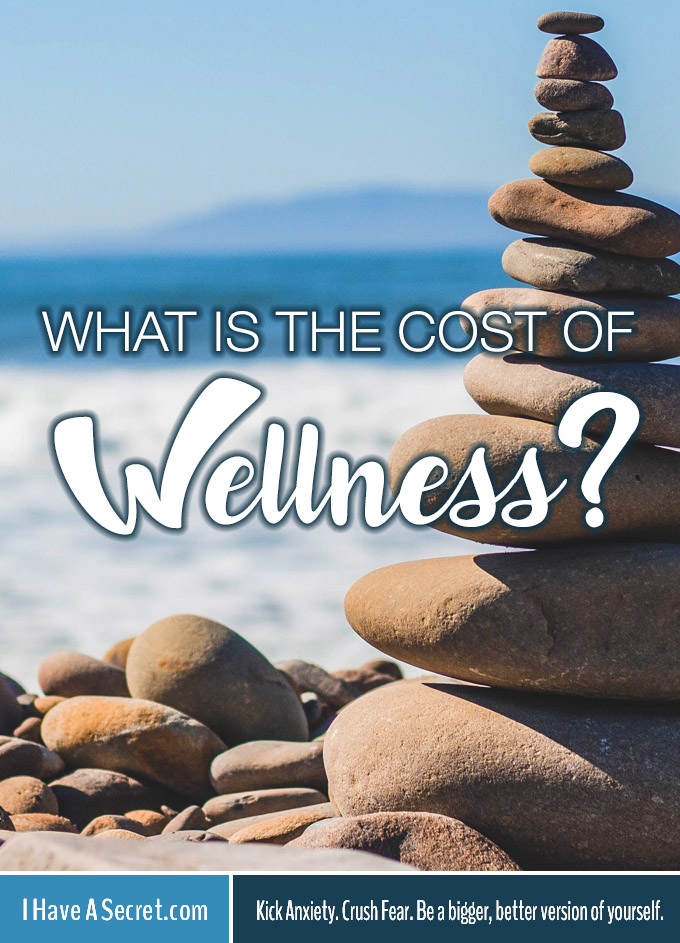Wellness is an abstract, nebulous concept that seems to mean “healthy”, but also that your well-being is on point. Usually, it’s a term used in alternative medicine and the high-end spa industry to fleece you for money. But seriously, what is the cost of wellness?

Many people in this world are lucky to be able to afford a decent dinner this evening. They don’t have extra cash to spend on vitamins, potions, super juice and fancy massages. Many people also don’t have the time to take a few hours out of their day to go for a yoga class, a nature walk, a therapy session. Websites always say that these things only take an hour, but when you factor in preparation, transit both ways and changing, it adds up quickly. Suddenly it’s two and a half hours later and your entire evening is gone.
I see the word “wellness” used especially for extremely expensive decadent treatments. Alaskan clay face masks, organic nutrient-rich bath bombs, and dodgy pseudoscience quackery like homeopathy (a TOTAL fraud – let James Randi explain here and here).
For people of a more logical mindset, wellness can be your state of mind and state of health combined. We have to take care of work, family obligations, and our homes first. Then we take care of ourselves, on a basic survival level – food, water, sleep, stretch once in a while. If there is time or energy left over after that, it’s great if we can treat our body and minds to a little something extra.
It doesn’t have to be expensive. Throw a teaspoon of shampoo and one drop of fragrant oil into your bath, and shazam – it’s a spa treatment. Take five minutes to massage yourself with a cheap oatmeal body cream. You don’t need to pay attention to all of those fancy ads implying that your health and well-being depend on you shelling out money for treatments and creams and weird superfoods.
Several recent studies have shown that in terms of longevity, having strong friendships and close relationships can be a more important factor in your health and well-being than smoking.
I searched for a relationship worksheet that focused on friendships, but they were mostly for children. Isn’t that odd? Friendships are just as important for adults – it’s our social circle that helps us navigate through this strange world. Make your own worksheet – jot down a list of your five closest friends, and take a few moments to think about what you’re gaining from the relationship, what you put into it, and how everything is working out so far. Does anything need to be worked on or improved?
Many people discuss “mindfulness”, where we learn to notice thoughts and feelings with no judgment, just awareness. There are many books on this subject, along with classes, videos, etc. Take a look at the concept itself before spending your money
If you’re looking into counseling and improving relationships, there are many great articles here: https://www.regain.us/ Online therapy can be far more cost-effective and can be easier to get started.
When it comes to treating yourself, some people go straight for the top shelf liquor or extravagant dinner out. Or, we can choose to concentrate on the little things, like a nice home-cooked meal with a bottle of cheap wine, and splurge for the good cheese, or some dark chocolate. (Home cooked meals are nearly guaranteed to contain less sugar, salt, and oil.) There is a compromise between feeling like you’re indulging in a treat and feeling healthy. What feels like a treat, but is also good for you?
Spending money on yourself doesn’t improve your health. It’s one of the ways that commercialism messes with our minds. Just because the people in the spa ads are gorgeous and radiantly healthy doesn’t mean it has a darn thing to do with that treatment. It’s more likely healthy parents and fabulous lighting.
If we do choose to treat ourselves, why not make it productive in more ways than just a little dopamine hit of purchasing a new thing? Buy the nice bread while supporting your amazing local bakery. If you’re having an exhausting day, have a super juice to keep you going instead of a sugary five dollar coffee. Or, instead of pepping yourself up with a donut, grab an apple and phone a friend. A short conversation about someone else’s world can be very refreshing.
Whenever you see health and wellness claims online, or in the media, always look at where they are coming from, who paid for the “study”, and what they are trying to sell you.
You don’t need forty dollar breakfast juice, bottles of weird under-tested pills and hundred dollar seaweed eye cream to feel and look well. The cost of wellness is as much or as little as you see fit. If you feel happy and healthy in your life right now, you’re good. You don’t need a week-long cleanse. You might need more salad, more water, and a springtime walk with some buddies.
PS: Seriously, never underestimate the cheap drugstore oatmeal body cream. The generic one in the beige bottle. It’s fabulous.
Thanks for reading, and please join the email list for weekly-ish updates (easy to unsubscribe later – test it for a few weeks).
As always, you can help support this site by throwing $2 (or whatever) towards hosting bills here:






